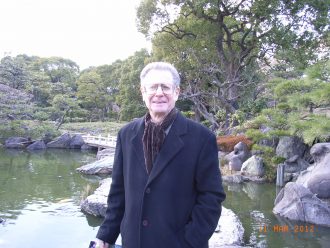
斯洛特教授
斯洛特教授
邁阿密大學UST倫理學講座教授
斯洛特教授,哈佛大學學士、哲學博士,現任邁阿密大學UST倫理學講座教授;皇家愛爾蘭學院成員、前Tanner講師;2013年在上海華東師範大學馮契智慧講壇上發表演講,並擔任湖北大學榮譽教授至今。曾任教於哥倫比亞大學、都柏林聖三一學院(現為該校院士)、馬里蘭大學學院市分校(曾於該校擔任系主任一職),2002年加入邁阿密大學。
斯洛特教授著述甚豐,其專著及論文大多以倫理學為題,近年更旁及知識論、形上學、語言哲學、心靈哲學。最近,他對西方哲學與中國哲學的關係產生興趣,進而開展相關研究,探討西方哲學如何可與中國哲學的「陰陽」、「心」、「道」、「氣」、「太極」、「天地」、「和」等等觀念融合,以豐富西方哲學的內涵。最新專論《陰陽哲學》將以中英對照形式由商務印書館出版,2018年面世。
斯洛特教授是第二十五位唐君毅訪問教授。他將以「東西方論情感」為題主持公開演講;此外也會為本系主持教職員研討會,題目是「最新中國哲學詞彙:對『陰陽』、『氣』、『太極』、『道』、『天地』、『和』之理解」。其整體立論是:「陰陽」不僅是「心」及其德性的基礎,也是吾人理解自然、探索宇宙和諧的基石。
東西方論情感

摘要:
中國思想比西方思想更着重情感因素。西方語言講 “mind” 或相對應的詞彙,東亞語言如韓文、中文、日文則說「心」;前者假設思維活動無需情感,後者則無此假設。在這方面,東亞的思想其實更切合我們的心理,因為心智的認知能力涉及信念,而信念本身又必涉及情感。如果心理的正常運作需要情感,那麼許多西方的倫理觀念便錯了。康德和一些較近期的理性主義者認為,道德知識以及建基於道德知識的動機無需情感即可產生。假若如我所言這種觀念是錯誤的,那麼道德理性主義便不再是一個倫理學選項。有趣的是,中國思想從來沒有支持過任何(純粹的)理性主義倫理學;在儒家思想的道德德性中,理性最多也只是與情感一起發揮作用。而且,在眾多中國思想家中,至少有一位是純粹的道德情感論者,那就是孟子。孟子的「四端」,作為情感反應,構成了道德德性的基礎。在西方,休謨以及其他一些思想家對道德的基礎也有類似的見解。因此,假如理性主義可以拋棄,那麼,真正的問題就是:純粹情感主義,或者某些情感和理性因素的結合,可否視為道德思考和道德德性的正當基礎?本講將簡論純粹情感主義,並集中探討孟子/休謨的觀點。
日期/時間:
3月2日 (星期五) 2:30 – 5:15 p.m.
3月9日 (星期五) 2:30 – 5:15 p.m.
3月14日 (星期三) 6:30 – 9:15 p.m.
3月23日 (星期五) 2:30 – 5:15 p.m.
課室:
香港中文大學李達三樓214室 (LSK 214)
The seminar will focus on ways the traditional Chinese ideas of yin and yang can be made relevant to contemporary philosophizing. I will give four different lectures illustrating this point and showing in particular how yin/yang can help us in epistemology, ethics, philosophy of mind, and metaphysics more generally. The students are not expected to do any reading in advance of or for the seminar, but their eventual papers, due in May, 2018, should represent some kind of following up on the ideas mentioned and discussed during the seminars. This could involve reading more Chinese classics, but also or independently could involve interaction with various aspects of present-day or recent Western philosophy. The students writing the papers are encouraged to engage critically with the content of the lectures and/or to further develop some of the themes of the lectures. Papers should be at least 5000 words in length.
最新中國哲學詞彙:對『陰陽』、『氣』、『太極』、『道』、『天地』、『和』之理解

摘要:
Recent Chinese philosophy has to a large extent looked to Western philosophy for guidance, direction, and renewal, but this has involved a neglect of certain Chinese categories that can do a lot of important work for philosophers East and West. However, in order to be thus relevant the categories need to be updated or winnowed. For example, yin and yang are traditionally associated with physical concepts like wet and dry, cold and warm, and Chinese philosophers have, I think, rightly seen that such thinking is not going to be much help to present-day philosophy. But deep within traditional Chinese thinking, there is also a tendency to view yin as something like receptivity and yang as something like directed activity or purpose, and thus understood, yin and yang and yin/yang can, unexpectedly, help us better understand ethics, epistemology, and philosophy of mind.
In ethics, for example, a virtue like compassion or ren has both a yin and yang aspect: involving as it does both empathic receptivity to the suffering of another and motivation directed at helping the other. As with yin and yang, I shall argue that these two sides of compassion and other moral emotions are mutually dependent or complementary. In philosophy of mind, belief and desire are often seen as the main basic elements of psychological functioning, and it can be argued that both these components of the mind or heart-mind involve emotion. Belief is receptive or yin emotion and desire is actively directed yang emotion, and given these two complementary forms of emotion, it is natural to think that there is something more general that can be called emotionality and that can assume these different and complementary emotional forms. And emotionality can be equated with qi as it appears within the heart-mind.
Dao is a much honored and central notion in Chinese thought, but it doesn’t as such mandate any specific qualities as virtues or any specific actions as morally incumbent on us. By contrast, I argue, yin/yang enables us to explain how and why compassion, etc., are virtues. It thus does more moral-theoretic work for us, but it is then possible to understand Dao in the light of the foundational emphasis on yin/yang. Dao may make no specific moral recommendations, but it does embody the idea that truly understanding the ultimate order of things necessitates a commitment to living in accordance with that order. This means that if we are really receptive to how things are we will act virtuously, and in the terms I defend, this also means that Dao can be understood as the basic idea that yin requires and calls for yang. There is also the idea that yang requires yin, and I believe this fundamental idea is embedded in the concept of Tiandi. The yang of Heavenly activity cannot occur without Earth’s being receptive to that activity, for in the absence of Earth, Heaven has nothing to work on. So in the light of what I have to say about yin/yang we can give Dao and Tiandi philosophically justifiable places within contemporary philosophical thinking.
If time permits, I will extend my yin/yang analysis to the natural world outside mind or xin. If it applies there, then qi and taiji can be thought of as basic to the whole cosmos: both humans and nature—just the way Zho Dunyi thought. But my argument will depend on facts of modern physics Zho was of course unaware of. Newton’s laws instantiate yin and yang, as do familiar laws in chemistry and biology. But then, if both nature and humans exemplify the same basic yin/yang, there is a harmony to the entire universe that Western philosophy has never dreamt of. Chinese thought has traditionally believed in such harmony or he, but it helps to use modern physics and certain Western-style arguments in order to show how and why this is the case. Chinese optimism about the universe and ourselves is to that extent vindicated against pessimistic Western dualism and epistemological skepticism.




